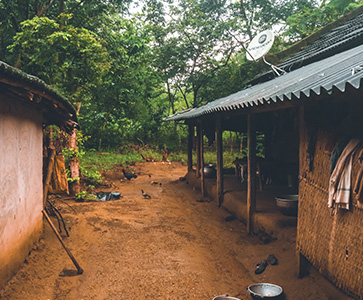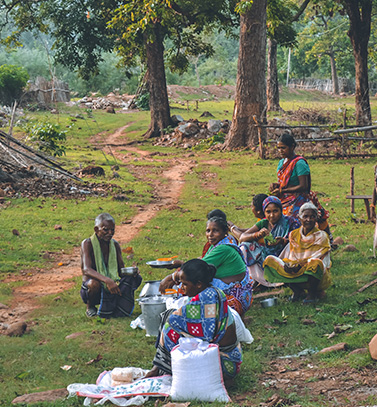Enhancing livelihoods by addressing energy gaps through affordable and sustainable DRE solutions
Sustain Plus’s focus is to enhance rural productivity and income by reducing drudgery, improving health, and increasing time efficiency through affordable and easy-to-use DRE solutions. By making renewal energy accessible to the poor, the program enables rural and tribal communities to improve processes, creates new entrepreneurial opportunities for individuals and community-based institutions, and accelerates the availability of options for technology solutions that safeguard the environment.
Together with its grassroots partner network, Sustain Plus addresses identified energy gaps in the farm and non-farm value chains using community-centric, sustainable, and scalable programs. These programs are designed to integrate DRE solutions in existing and new productive processes via implementation models that empower the communities to gain long-term benefits. Sustain Plus’s work is spread across a range of productive value chains and activities that include agriculture, livestock management, rural mobility, and enterprise development.


Need Gaps
Even though India is the third largest energy market globally, access to energy within the country is still inequitable with millions of people remaining off-grid, especially in rural India. Due to the lack of reliable grid access and the use of out-dated tools and methods for productive activities, rural communities continue to incur high costs in labour-intensive and low technology livelihood practices. This is a significant and critical impediment to rural development and sustainable livelihoods.
Recent solutions to address the energy and livelihood gaps have focused on creating innovations that are centralized, large-scale, and technology driven. Though localized technology innovations are also becoming available, there is a lack of support at the entrepreneurship level for on-ground technology validation especially in remote regions, absence of patient capital to help enterprises tide over the delay in financial returns, and lack of business models to cater to specific geography and community needs.
Our Approach
Sustain Plus collaborates with multiple stakeholders within the productive value chain ecosystems to enable community-centric solutions that are appropriate to the unique requirements of different geographies and local systems. With its focus on plugging the energy gaps, Sustain Plus’s delivery and implementation models aim to address the existing large-scale rural unemployment that has been further exacerbated during the COVID-19 pandemic.
-
Fostering Entrepreneurship
Sustain Plus promotes entrepreneurship and institution building by ensuring that communities own and invest in the implemented technology solutions, thereby, empowering them to control the processes and extract maximum value over time. Depending on the nature of the solution, its scale and processes, the ownership of these last-mile clean energy enterprises ranges from individual owners and operators to existing community-based institutions such as Self Help Groups, Farmers’ Groups, FPOs, etc.
To aid local enterprises, Sustain Plus leverages its partner and stakeholder network to enhance their business models and financial viability, enables access to low interest financing options, creates linkages with other value chain partners, supports access to markets, and builds capacity of communities to operate and maintain DRE solutions efficiently.
-
Enabling Technology and Business Innovation
Sustain Plus works with technology providers, implementation partners, and communities to optimize the economic potential of productive value chains through innovative business and delivery models. Appropriate technology solutions often fail to reach the masses due to various reasons such as lack of awareness, availability, high capital costs, lack of financing, technical complexities, and gaps in context-specific customization. Sustain Plus encourages and supports innovative and resource-effective business models that allow community ownership and financial contribution for asset creation along with systems for efficient monitoring. It also strengthens the value chain ecosystems by establishing local processes that provide maintenance and repair services on a timely basis.
-
Creating Linkages
Sustain Plus takes an integrated approach toward maximizing the scale and impact of its programs by establishing linkages and collaborations with diverse stakeholders at various stages. By aligning with government efforts, Sustain Plus facilitates communities to leverage various government schemes to cover interventions comprehensively and intensify their impact.
Farm and Non-farm Livelihoods Value Chain
- Leverage government schemes
- Unlock funds from institutions such as rural cooperative banks, micro-finance institutions, and nationalized banks by de-risking technology
- Support grassroots enterprises or technology vendors
- Establish delivery enterprises or system integrators
- Enable value-added products through technology vendors
- Improve price by linking with corporate buyers and e-commerce platforms or by selling directly to mandis and producers’ organizations
Sustain Plus helps unlock financing opportunities by minimising the risk on new DRE technology, encouraging financial institutions to extend affordable loans, and engaging its partner network to enable high repayment rates. It endeavours to establish credit lines through solution providers by making solutions more affordable for end users. Sustain Plus also leverages its stakeholder network to facilitate and establish initial market linkages in order to increase process efficiency and create value-added products at the village/cluster level.


